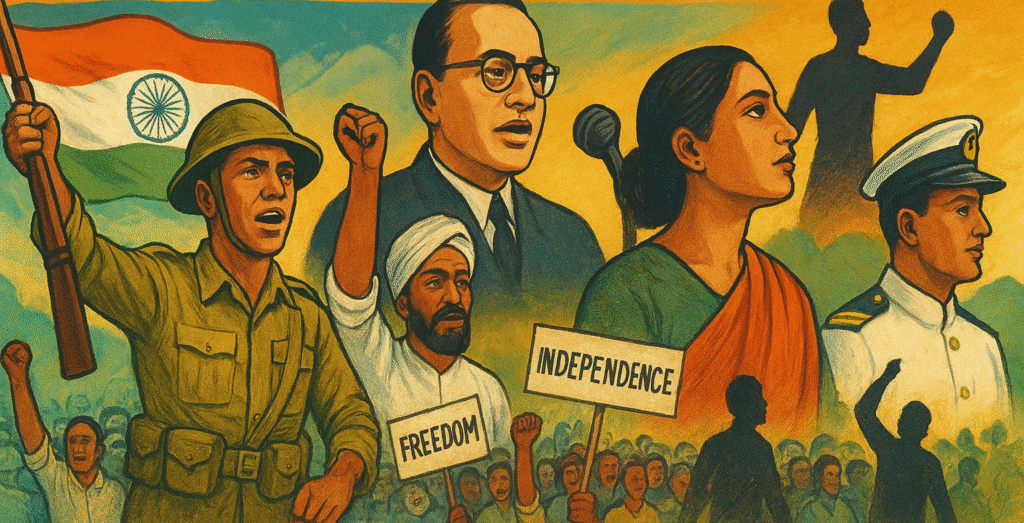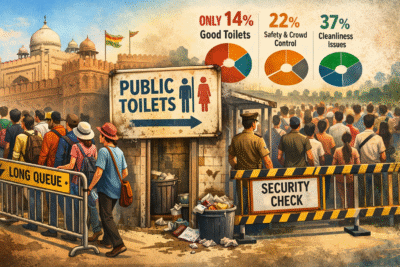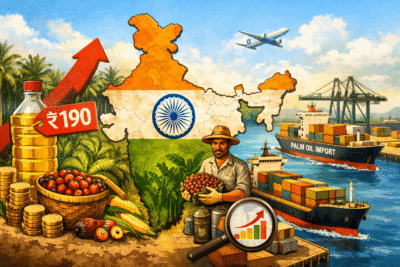
India takes pride in its fight to force the British out of the country in 1947 to end their streak of taxing and punishing the nation for 190 years. The struggle symbolically ended on August 14, giving India a day to celebrate the spirit of its dauntless courage in the face of the mightiest royal power on Earth.
The historians took up a task to reconstruct the story of India’s path to freedom, which actually was a tool to own the right to decide the laws, rules and policies to govern ourselves. No allegiance to any foreign power or institution in any form.
The history books tell us about big political forces that spoke to the British with the same legal and moral force, such as Mahatma Gandhi and the Congress that was ironically founded by an Englishman, AO Hume, in 1885.
But as Indian scholarship deepens and democratises, new perspectives are emerging with more concrete of authenticity. These paint a vastly different picture of the reasons that would actually have driven the British out of the Indian subcontinent, though not without fragmenting the land and its people, perhaps forever.
Let’s have a look at 10 factors that left the British with no option but execute the largest Brexit till date:
1. Indian soldiers from WWII became game-changers
Over 2.5 million Indian soldiers fought for the British in World War II, making it the largest volunteer army in history. Their exposure to global warfare, new ideas, and democratic ideals fueled a heightened sense of nationalism.
When soldiers returned home, their expectations for freedom and respect clashed with colonial subjugation. The war effort had drained Britain financially and morally shaken its hold on India. The courage and sacrifices of Indian troops underlined that Indians were ready to govern themselves, pushing the British to reconsider their authority over a nation that had deeply contributed to the Allied victory.
2. Western-educated Indian leaders mastered political strategy
Many of India’s foremost leaders, including Nehru and Ambedkar, were educated in British universities, gaining deep insight into Western politics, law, and democratic ideals. This education equipped them to challenge colonial rule through legal and political means on a global stage.
Their ability to articulate India’s cause in terms familiar to colonial powers helped garner international sympathy and respect. They negotiated skillfully, blended reformist and radical ideas, and used their knowledge to channel Indian aspirations into organized political movements, making Indian independence a viable international demand.
3. Indian diaspora emerged as the overseas powerhouse
The Indian diaspora played a critical, often overlooked, role in India’s freedom struggle. From the Ghadar Party in America to activists in Europe and Africa, expatriate Indians provided vital funding, propaganda, and lobbying support. Their international networks created pressure points both politically and socially, influencing British policymakers and raising global awareness about India’s plight.
Diaspora leaders mobilized Indian communities abroad, united diverse groups under the independence banner, and inspired a transnational nationalist spirit that connected India’s freedom with global anti-colonial movements.
4. Underground media relayed voices of rebellion
Clandestine newspapers, leaflets, and pamphlets ignited nationalist fervor across India, spreading ideas that mainstream media often censored. The underground press — including vernacular and revolutionary publications — exposed British atrocities, inspired local uprisings, and coordinated protests.
This network bypassed colonial filters, empowering ordinary Indians to engage in the independence movement. In a largely illiterate society, vernacular media spread swiftly, uniting disparate regions through shared sentiments and fostering a collective resistance culture. The media’s role was crucial in building momentum and sustaining the fight for freedom beyond elite circles.
5. Global decolonisation boosted India’s cause on the world stage
Post-World War II, a widespread wave of decolonization swept across Asia and Africa. Countries like Indonesia, Vietnam, and Burma successfully challenged their colonial rulers, setting powerful precedents. This global trend heightened moral and political pressure on Britain to relinquish India, as maintaining empires was increasingly seen as unjust and outdated.
International bodies and public opinion began favoring self-rule. India’s freedom struggle became part of a larger global narrative of oppressed nations demanding dignity and sovereignty, making British colonialism increasingly untenable on the world stage.
6. Labour Party’s rise sanitised British politics
The Labour Party’s post-war ascent in Britain marked a significant ideological shift. Unlike their Conservative predecessors, Labour politicians were more sympathetic to anti-colonial aspirations and willing to consider India’s independence seriously. Driven by principles of social justice and democracy, the party engaged in diplomatic maneuvers that facilitated British withdrawal.
Labour’s domestic political priorities, combined with economic realities, led to a pragmatic approach that embraced decolonization, helping convert India’s struggle from a rebellion into a legitimate political transition supported at the highest levels in London.
7. Armed defiance of Bose’s Indian National Army
Subhas Chandra Bose’s Indian National Army (INA) fought the British with Japanese support during World War II, embodying revolutionary militancy. The INA’s campaign in eastern India and Burma, though militarily limited, had a profound psychological effect. Its soldiers, many former British Indian Army personnel, defected in large numbers, questioning loyalty to the British.
The INA trials post-war sparked widespread sympathy and galvanized public opinion, casting doubt on British legitimacy. Bose’s charisma and the INA’s armed resistance energized the independence movement, adding urgency and a new dimension to the struggle beyond peaceful protests.
8. Royal Indian Navy mutiny of 1946 broke the British chain
The Royal Indian Navy Mutiny was a spontaneous, widespread revolt by approximately 20,000 sailors protesting poor conditions and British authority. What began as a naval strike spread rapidly, igniting protests by soldiers, workers, and civilians nationwide. The British were stunned — revolt in their trusted armed forces revealed deep systemic cracks.
The mutiny marked a turning point, convincing Britain that commanding India’s military forces was no longer reliable and that colonial rule was unsustainable. It inspired other uprisings, intensified pressure on the Raj, and hastened plans for independence.
9. Regional India rose on its feet challenging the British on many fronts simultaneously
India’s independence was not solely a story of Gandhi and Congress; robust resistance flourished regionally. Movements like the Telangana Rebellion, the militant factions in Bengal, and grassroots uprisings in Punjab sustained continuous pressure on the British. These regional struggles reflected local grievances and inspired solidarity across social and cultural divides.
Their persistence showcased the broad dissatisfaction with colonial rule beyond elite centers and demonstrated that India’s freedom was demanded everywhere, complicating British attempts to maintain control through fragmented concessions.
10. Post-war British economic crisis was the Empire’s price tag it couldn’t afford
World War II left Britain financially exhausted and indebted. The empire’s maintenance became a costly liability that the war-weakened British economy could no longer support. Industrial infrastructure was damaged; social services were stretched thin.
The expenses involved in policing colonial uprisings, rebuilding war-torn Britain, and securing resources made India’s colonial rule impractical.
Economic realities forced Britain’s hand, transforming India’s independence from a question of political will into a financial necessity, accelerating decolonisation and the end of imperial domination.



